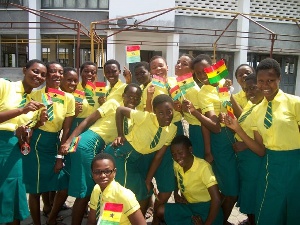Two weeks ago reports emerged that a parent wanted to withdraw his daughter from Wesley Girls High School located in the Central Region.
The reason being that the school – built on Methodist Church values – did not allow students irrespective of their faith to fast, whiles the girl in question being a Muslim was pushing to be allowed to engage in the Ramadan fast currently ongoing.
The father told Joy News, he wanted to withdraw the girl from the school but only backtracked when his daughter agreed to ‘stay and learn,’ when asked to choose between staying or leaving.
But that incident has since triggered a national debate around the religious rights of students via-a-vis observance of school rules.
So far, different groups of people have waded into the issue, from the part of the school – its administration, old students and the Methodist Church.
Whiles those calling for a compromise include the Muslim Caucus in Parliament, Office of the National Chief Imam and education rights groups.
In this article, GhanaWeb traces the trajectory of events since Ishmael Zakaria Alhassan, father of the first-year student Bushira Ishmael, went to the school in late April 2021 and the ripples that have followed.
27 April: Muslim caucus in Parliament visits school
A bipartisan group of Muslim MPs visited the school and had talks with administration before also holding talks with the head of the Methodist Church on amicable ways to resolve the impasse.
“The church assured the Muslim delegation of their commitment to resolve the issue within a couple of days In shaa Allah. His Eminence the Presiding Bishop assured that the Board of the school, of which he is the Chairman, will be meeting to discuss the issue and the concerns of the delegation and others will be graciously taken on board to amicably resolve the problem,” Minority Chief Whip Mohammed Mubarak Muntaka who led the delegation said in a statement after the meeting.
A representative from the Office of the National Chief Imam and other key stakeholders in the Muslim education ecosystem were part of the delegation.
May 3: GES issues ‘allow fasting’ directive to Wesley Girls
Fast forward to May 3, the Ghana Education Service, GES, issued a statement that directed that despite reservations and practice as the school claimed has been in place, Muslim students should be allowed to fast subject to express consent by their parents.
“The Ghana Education Service, therefore, directs authorities of Wesley Girls High School, as well as any other school to allow any such student who wishes to fast for any religious reason to do so," the statement signed by GES PRO said.
May 4: Methodist Church hits back
But in response, the Church's reply read in part: “The school rule in question is a long-standing one which is also non-religious and various renowned Muslim ladies in Ghana have passed through the school adhering to such a rule.
"The Methodist Church cannot accede to the unilateral directive issued by the Ghana Education Service and insists that the Ghana Education Service respects the long-standing partnership between Government and Mission Schools,” it concluded.
May 4: School PTA backs church’s position
Buttressing the church’s stance, the Parents – Teacher Association, PTA, also waded into the matter asking that the GES reconsiders its directive in the interest of standards and to avert potentially endless demands premised on religious considerations.
They urged “GES to reconsider its directive to the school and all other schools in order to avoid a situation where schools will be inundated with requests by parents and students on their individual religious preferences and practices.
“We are, therefore, uncomfortable with any directive that could compromise the health of our daughters whom we have entrusted to the school. From our feedback and observation, the school strictly enforces its policies without discrimination,” the PTA’s statement said.
May 6: Chief Imam issues official statement
The National Chief Imam, Sheikh Osmanu Nuhu Sharubutu, issued an official statement signed by his spokesman, Sheikh Arimiyawo Shaibu, largely expressing concerns about the rising sentiments being expressed by parties in the matter.
The seven-paragraph statement read in part: “The National Chief Imam is also of the firm belief that with sober minds, deeper reflection and empathetic engagements, the matter could be amicably resolved as soon as possible.
“The National Chief Imam further appeals to the Christian Mission schools to treat his grandchildren with love, dignity and empathy for the enhancement of national integration. By this we will be able to make of these students the all-time ambassadors and defenders of interfaith love, co-operation and harmony in Ghana.
May 6: National Peace Council reacts
The National Peace Council on its part issued a statement on Thursday calling for calm and sober heads as key stakeholders worked to resolve the impasse.
“The council appeals to the leadership of the Christian and Muslim communities to urge their followers to remain calm as efforts to build on the time-tested peaceful co-existence among Christians and Muslims are made by the relevant authorities and organisations,” a statement from the NPC and signed by the Chairman, Rev. Ernest Adu Gyamfi read.
May 6: Wey Gey Hey Old Students back school
The school’s Old Girls’ Association (WGHS OGA) in a statement backed the church and PTA position stressing that the ‘No fasting’ policy was made for health reasons but not to discriminate against other faiths.
This was contained in a statement signed by Effie Simpson, the National President of the Association.
It read in part: “OGA will continue to support the Headmistress, the Board and all authorities of the School to enforce rules and regulations that seek to serve the purpose of instilling discipline and supporting the holistic upbringing of students.
Conclusion
At this stage, all stakeholders seized with the issue are waiting to converge again around the dialogue table in order to advance efforts aimed at reaching an amicable conclusion.
The wider topic of Muslim students’ rights to exhibit their faith – i.e. offering prayers and in the case of girls wearing the Islamic head covering, the hijab – will likely be up for debate depending on how this particular episode is resolved.
Click to view details



General News of Friday, 7 May 2021
Source: www.ghanaweb.com

















